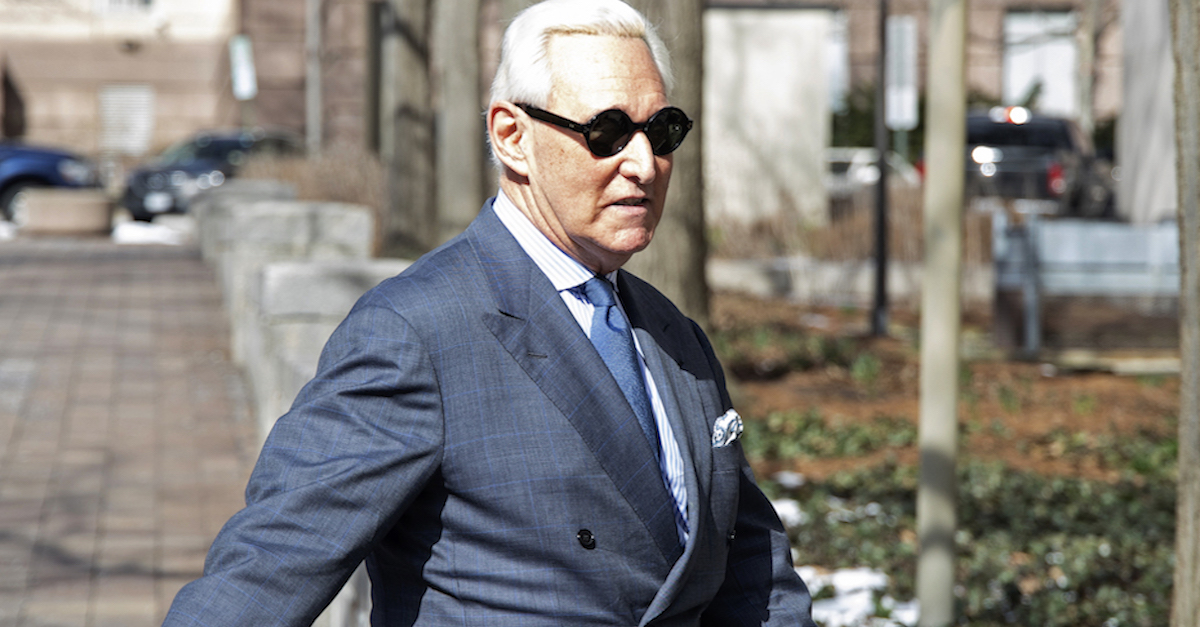
Defense lawyers for Roger Stone, longtime ally of President Donald Trump, tried their best on Thursday to convince U.S. District Judge Amy Berman Jackson that the most reasonable course of action would be to throw out the indictment handed down by Special Counsel Robert Mueller. It didn’t go over well.
While Stone and Jackson don’t exactly have the best history, the same could be said of Stone’s lawyers (albeit for different reasons).
Stone, who faces seven counts, including obstruction of an official proceeding, five counts of making false statements, and one count of witness tampering, is still on track for an early November trial. His lawyers came up with what has been described as a “menu of creative constitutional arguments” to have the indictment dismissed.
Two of these arguments, which went nowhere, were as follows: the indictment was improperly issued because Congress didn’t make formal referral of allegations; Mueller’s investigation was improperly funded.
On the first, Stone attorney Robert Buschel claimed that because Congress didn’t formally refer Stone’s alleged false statements to Mueller the indictment violated the separation of powers and should be dismissed. When Jackson asked Buschel for a legal authority to support this position he could not provide one.
That wasn’t all, though. Jackson pointed out that former House Intelligence Committee chairman Rep. Devin Nunes (R-Calif.) handed Mueller the Stone transcript with “no restrictions.”
“Why is that not the end of it? she asked. “They gave it to a prosecutor.”
Buschel attempted to cite a memo from Attorney General William Barr to say Mueller couldn’t prosecute Stone for obstruction because he didn’t allege a grand conspiracy between the Trump campaign and Russia. Jackson asked for “case law” to support that and Buschel only had the Barr memo.
Stone attorney Bruce Rogow argued the other issue, about Mueller’s funding. He claimed that Mueller’s appointment violated the Constitution’s appropriations clause because he was not funded with properly appropriated money. Interestingly, to make this argument, Stone lawyers acknowledged that Mueller is an “inferior” officer under the Constitution. Everyone who has challenged Mueller’s authority (ex-Stone aide Andrew Miller included) has argued that Mueller is a “principal” officer under the Constitution — meaning Mueller needed to be nominated by the president and confirmed by the Senate. As you may have heard, then-Deputy Attorney General Rod Rosenstein appointed Mueller as special counsel; Mueller was neither appointed by Trump nor confirmed by the Senate.
At any rate, after implicitly acknowledging that Mueller was constitutionally appointed as special counsel, Stone’s lawyers then said that Mueller was improperly funded according to Constitution.
Mueller’s probe was paid for under a perpetual allocation created by Congress in 1987 for independent — not special — counsels, a under a statutory scheme Congress let lapse in 1999, Rogow said. Lawmakers never amended the funding provision.
“What appropriation has been made by Congress to pay a special counsel [emphasis ours]?” Rogow asked.
Prosecutor Adam Jed, formerly of Mueller’s office, answered by pointing to the aforementioned “perpetual allocation” that has funded other special prosecutors since the “statutory scheme” lapsed.
The ensuing debate was described as hair-splitting over a lowercase ‘i’ and an uppercase ‘I’:
This is a great example of what covering courts is like: Two sides arguing over whether “independent” is different from “Independent” and whether one type of independence is similar enough to another type of independence
— Zoe Tillman (@ZoeTillman) May 30, 2019
Jackson reaction to the argument was, in turn, described as “skeptical”:
Again, Jackson appeared skeptical of the claim, noting Congress had funded other similar special prosecutors even after the Independent Counsel Act expired. She asked what distinction he drew between Mueller and former U.S. Attorney Patrick Fitzgerald, for example, who led the leak investigation in the Valerie Plame affair. Rogow argued Fitzgerald, unlike Mueller, had more expansive and “plenary” powers and was thus truly independent.
Rogow eventually attempted to argue that Mueller shouldn’t have been able to investigate Trump or the Trump campaign, even citing a dissent from deceased Supreme Court Justice Antonin Scalia.
Jackson promptly noted that the Supreme Court decided in United States v. Nixon that the president can be investigated and that, in any event, Stone is not the president.
“I’m not bound by that?” Jackson asked Rogow of the United States v. Nixon precedent. “You are,” Rogow answered.
Jackson has not yet ruled on the dismissal of the indictment. If her response to the various arguments put forth on Thursday are any indication, we may already know how she will rule.
[Image via Alex Wroblewski/Getty Images]